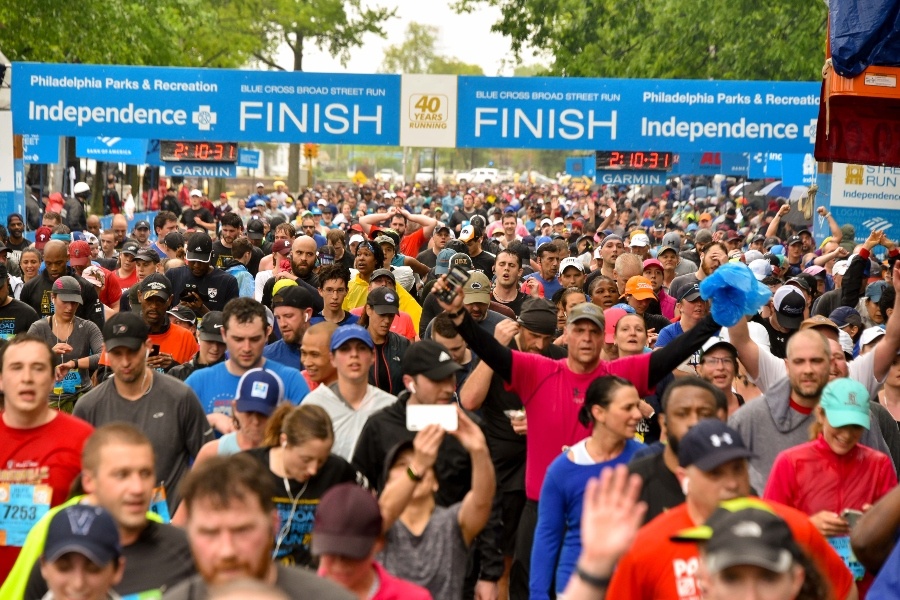7 Ways to Stay Motivated Despite a Postponed Race
A ton of Philly athletes were training for... something. Here's how to beat the cancelled-race blues and keep moving.

So your race was postponed? Here are tips from Philly pros on how to modify your training and stay motivated now. / Photograph by Ryan Bethke / RWBmultimedia.
This time of year normally means two things for runners: the tail-end of training and the beginning of race season. But as coronavirus would have it, races like the Broad Street Run and the Love Run Philadelphia Half Marathon have been postponed all the way to October.
If you were diligently training for (what would have been) an upcoming race, you might be left feeling dejected — plus wondering how to modify your running and pacing schedules, as well as stay motivated. But with the clock totally reset, now can be a good time to take advantage of the longer training period to mix up your routine. (If you’re running outside, make sure you’re socially distancing yourself and not running behind anyone for long periods.) To help you out, we turned to local running and mental health pros for their advice on what you can do right now.
Realize it’s okay to be upset about it.
“It really is okay if you feel frustrated, mad or sad because your sports season ended, race was cancelled, or your workout routine was ruined. You’re not being self-centered or selfish,” says Dr. Mitchell Greene, owner of Greenepsych Clinical & Sport Psychology, Haverford.”It’s true people are struggling mightily during quarantine, with far more significant problems, but your sport is important to you for many reasons, including its clear benefits to your mood and relationships.”
Be flexible and adjust your goals.
For runners who use races as a milestone for training, it might be helpful to think more about your progress as a runner than toward a specific event, says Ryan Callahan, race director of The Philly 10K and president of Runhouse. To shift your focus from race training to maintaining your fitness and excitement about running, he suggests setting a mileage goal that you can build up to, plus throwing in some speed workouts in order to progressively get faster. Putting a little more mileage and strength in your legs now will pay off on race day, no matter if it has been delayed.
“Many athletes, from recreational to professional, are either all-in or all-out,” adds Greene, “They train specifically for that next race, or say they will only do a certain type of exercising, like HIIT workouts at their gym, or group runs with their running club. The problem with that fixed mindset is that right now, being ‘all-in’ is practically impossible to accomplish. Instead, remember that mental health is directly tied to flexible thinking, and your ability to embrace the challenge of trying something novel and different.”
Manage your running load.
According to MossRehab physical therapist and avid runner Kelsy Espy, load management is key to preventing injury. That means, just because you’re bummed about your race being cancelled, doesn’t mean you have to run more than ever now. It’s all about balance.
To build your aerobic base in a safe way over the next several weeks, she recommends running three to four days per week for 30 minutes at a conversational pace. Doing so will prepare you for safe progression to the next phases of your training when you’ll be increasing distance and speed. “With every stride, our bones, tendons, and ligaments accept up to three times our body weight,” Espy says. “A one-mile run typically consists of 1,000 to 1,500 foot contacts, which is a lot of force when you stop and think about it.”
Use your new schedule to incorporate other workouts.
Liz Pagonis, marketing director of Philadelphia Runner, says now is a great time to think about postponement as an opportunity to build on your previous training and implement supplemental workouts, like strength training, yoga, speed work, and hills. That’s because cross training can be a useful way to strengthen your total body and build flexibility. Many Philly fitness studios and instructors are currently streaming at-home workouts, and Dan Cruz of Motiv Running let us know that the Love Run has a free cross training group, thanks to their partner CoreFitness.
For specific strength training help, Espy says strength training should be done two or three days per week. “A few of my favorite home-strengthening exercises for runners include dynamic front and side planks, dead bug variations, single leg sit to stands, weighted step-ups, and lateral walking in a squat position or lateral lunges,” she says. “Plyometric work can also be incorporated without any equipment. Try holding a squat for three seconds, jumping forward, and holding that squat for another three seconds. Do this for one minute or to fatigue.”

The Blue Cross Broad Street Run has been postponed to October 4th. / Photograph courtesy of Independence Blue Cross.
Find an accountability partner.
If you are struggling to find motivation, find a friend who can keep you accountable to at-home workouts, or your runs or bike rides. Michele Redrow, the race director of the Love Run, has been running with her husband every day as a way to not only safely get out of the house for a bit, but to keep their muscles moving.
If you and your running pal don’t live together and can’t put in miles together due to social distancing, Callahan recommends challenging each other by planning your run at the same time to mimic a typical partner or group run. After, check in with each other to track progress and celebrate each other’s successes.
And, talk to your friends about your plans. “Your best medicine during this time when you might feel down is to communicate with others from your fitness community,” says Greene, “Who else will understand what it’s like to miss Broad Street or worry if your fall marathon will be cancelled than someone else who had their heart set on completing that same race?”
If you’re typically part of a running group, Espy suggests instead planning a virtual race with your pack. Choose a date, set a distance, and compete. Then, hop on a group Zoom call for a post-race happy hour!
Try to maintain your race-related eating habits.
Einstein Healthcare Network dietitian Danielle Zolotnitsky offers these nutrition tips on how to keep your body fueled and race-ready for the next six months:
- For runs longer than 90 minutes, make sure you are eating a larger serving of starchy carbohydrates as part of your dinner the night before. Potatoes, rice, whole grain pasta, farro, beans, and plantains are foods that can help store energy.
- Spread out your protein during the day, rather than having it all at one time. Protein needs vary based on your weight, training intensity, strength training, and age, but a general rule of thumb is to aim for a protein source with every meal or snack. Eggs, nuts, nut butter, fish, poultry, beans, Greek yogurt, cottage cheese, lean beef, and pork can help do the trick.
- Whether you are running, walking, or cross-training, eating healthy fats is a fantastic way to support your muscles and cardiovascular system. Try fatty fish (salmon, tuna, mackerel), nuts (walnuts, almonds, cashews), olives, seeds, and avocado.
- Perfect the pre- and post-run snacks. If you are taking a longer morning run to mimic the race, you can trial some breakfast foods and see what you tolerate the best. An ideal pre-run breakfast consists of a well-digested carb, like oatmeal, banana, toast with nut butter, half of a bagel with light spread, or cereal (like Cheerios). Make sure you are also eating something after your run, as this will allow you to build more muscle mass and replenish energy stores. This should look like a 3:1 carb to protein ratio, with foods like chocolate milk, banana and peanut butter, eggs with sweet potato, Greek yogurt with berries, or a home-made smoothie with fruit and a protein source.
- Stay hydrated! Aim for around eight to ten glasses of water per day. Keep in mind that with a potential change in routine, like exercising at different times or working from home, can throw off meeting your hydration goals.
Overall, don’t be too hard on yourself.
These are weird times. The pros agree it’s totally okay to be bummed for a while, or to skip a virtual workout or run and veg out, because hey, runners are human, too! (Callahan has been enjoying some Milk Jawn ice cream.) Getting moving when you can is great, but listening to your body and mind is the most important thing right now. Your shoes will be there for you when you’re ready to lace up.
Want to hear more from us? Join Be Well Philly at:
FACEBOOK | INSTAGRAM | NEWSLETTER | TWITTER


